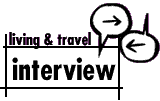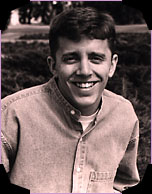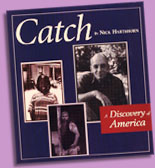

Nick Hartshorn
interviewed by Emma Taylor on July 10, 1996

Like driving down a highway; playing catch isn't constant sensory overload. Behind the wheel, you put in four hundred miles only to remember that one dead snake on the road and that one dust-covered blond woman who held a "SLOW" sign in the construction zone. After a hundred tosses, you remember this complete stranger telling you about getting high in Vietnam, and how once, out of nowhere, he threw a knuckleball. And the seams froze.
-- From Nick Hartshorn's book, "Catch: A Discovery of America."
Two years ago, Nick Hartshorn put three baseball gloves (one lefty) into the back of his '81 Honda Civic and hit the road. He drove on seven highways, through every region of the country, and played catch with whoever would join him, from Bob Costas, to a grandmother in Kansas, to an investment analyst in San Francisco. He recorded their conversations, took their photographs, and wrote a book: "Catch: A Discovery of America." When he's not playing catch, Nick Hartshorn is a journalist based in Aspen, Colorado.
Tripod: When did you decide that you wanted to make this trip across the country?
NH: I was living in Antigua, Guatemala, in the Spring of 1993. I thought I was going to get a scholarship and go overseas and do some studying, and that didn't work out. So I had the first few weeks of my life where I just didn't know what I was going to do.
Tripod: This was right out of school?
NH: This was a year after I got out of college. So I just relaxed and thought I'd enjoy my last couple of weeks and finish up my time in Guatemala, and lo and behold, ten days later, I awoke with the idea in my head.
Tripod: Was it an idea for the book, or for the trip?
NH: It was the idea for the book. I woke up, and the whole outline of the book was resting in my head. A lot of the book, and some of the celebrities I ended up interviewing, were actually part of the original idea.
Tripod: How did you manage to convince a publisher of your idea?
NH: I did a few stories on Colorado Public Radio, while I was doing the research, and very fortunately, the acquiring editor from MacMurry & Beck heard a few stories and got in touch with me. He said it was something he'd really like to look into, so I sent him a few sample chapters and it took off from there.
Tripod: Why catch?
NH: The idea that came to me was to have an activity that puts people at ease. It's two-fold: for one, it's an activity that takes their minds off the immediate reality that they're sharing their thoughts with a complete stranger, and secondly, baseball is the national pastime, and it has a way of tying together -- whether you're playing catch with a gang member in L.A. or a grandmother in Kansas, they're on the same playing field, in essence.
Tripod: One of Tripod's columnists just wrote about the Baseball Hall of Fame, and mentioned the same thing -- that seeing that museum, you can believe that America is small enough to be a community.
NH: Yeah, exactly. And I don't want to overplay it -- in the book there are some people who comment that baseball has been over-romanticized, and overused as a metaphor. But it definitely puts people at ease, and the majority of the time takes their minds off the fact that they're talking to someone who five minutes ago they'd never even heard of, nor met. And the way people play catch, and the way they throw the ball and the way their body relates to the activity draws some similarities and some differences to personalities across the country.

Tripod: Did you find a sense of an American community, or were you looking for individual, local communities?
NH: I was trying to find an overriding, overarching optimism or enthusiasm in America. I didn't go out there to prove that this is a crummy country and we're all going to hell in a handbasket. I had a more hopeful, optimistic, and youthful outlook from the outset. Being out there, you find that America is truly a nation of individuals. But then in asking people a lot of similar questions -- what do you hope for your life, what would you like to do, work-wise, what are words to live by -- I found that a lot of the underlying sentiment is very similar, though there were a lot of different answers. I found a very optimistic, very hopeful country. And people were very friendly. I was in New York City, L.A., talking to gang members, and they have a lot of the same hopes that the farm kids out in Iowa do. There's just not a lot of press given to how similar people are, how their passions reflect one another, from the city to the country.
Tripod: Was it hard to get people to play catch with you -- were they suspicious of you?
NH: In general, it wasn't too tough. There were a few that were suspicious, and some thought it was a corny idea, but it was more difficult, as a writer, to be open all the time and always wanting to talk to people. Sometimes you just get in a groove and want to stack up miles. It was a real challenge for me to stay out there and talk to as many people as possible every day.
Tripod: So there was some conflict between your role as an adventurer (i.e. observer) and your role as a writer -- which was to get inside and experience communities?
NH: Yes. You don't wake up every day and want to go and change the world. Some days I'd wake up and think, "Maybe I'll just drive 400 miles today instead of 200 miles and talk to three people." That's a nice way to put it though -- there were days when I wanted to be more an observer, and think about what had happened in the days past. But I always found that it would make the experience so much more rewarding if I would take the time and talk to whoever I saw, sitting in the local park or playing dominos down at the cafe.
NH: It was awfully random and not terribly scientific. In the western towns, one of the best ways to do it is to pick a county seat -- they have enough people to have a variety. I would go to the sheriff's dispatcher in the county courthouse and tell him or her what I was doing, and ask if they had any colorful characters in town they could steer me towards. Inevitably, they would send me to people who fit into the book, who had something to say and were informed about their communities. In the bigger cities, it was more random. Lunch break was a good time to go -- in San Diego and New York City I did that quite a bit. As far as the celebrities, they were less planned. I had requested interviews from them well in advance.
Tripod: Why Spike Lee and Bob Costas?
NH: I wrote to 65 celebrities before my trip, from Henry Kissinger to Dorothy Hamill. I got about 10 or 12 responses, and out of those, a handful of acceptances. Those were two of the guys who accepted and fit very well, content-wise, into the book.
Tripod: Were you nervous playing catch with them?
NH: Yeah. I was particularly nervous playing catch with Spike Lee, because it was such a different environment for me, to be in Brooklyn in the neighborhood. It wasn't dangerous, but it was just different from being raised on a farm in western Colorado, and I was in awe. Seeing him on film, and then seeing him on the sidewalk throwing the ball over your head. Bob Costas was quite a bit easier, because I was at his house, in his backyard, and it was like playing catch with your neighbor.
Tripod: You said you grew up on a farm in Colorado -- how did that background alter the way people treated you, from the city to the country?
NH: If anything, it helped out. I was raised in a real close-knit family, and quite a friendly and open community -- in Grand Junction, Colorado. I grew up in a town where you pull up the stop light and wave at everybody. If you were raised in a big city with high crime, you probably feel less secure about just heading out and talking to people.
Tripod: It's pretty idealistic, though, to treat the whole of America like a small town.
NH: If you go out thinking, "The country's a hellhole, I bet my car will get broken into," the chances are much better that it will happen. If you're resigned to the fact that it's going to get broken into, that affects the decisions you make about where you leave your car and how you leave it. But if you just can't see it happening, you make wiser decisions. That's what I found.
Tripod: What was your favorite game of catch?
NH: Oh, man! It's really tough to say. I played catch with Roy Blunt, the humor writer. He didn't end up in the book, but he threw the ball so hard that it was a real joy to sit out and throw the heaters with him. And he was hilarious, too. People-wise -- Bob Costas was a complete highlight for me because I've watched him so much; the Grandmother in Kansas, Marjorie Arford, was fantastic; the barber in Oregon ... I can't choose one.
Tripod: What was the hardest part of the trip?
NH: The worst was the first four to five days of the trip. I left Colorado and drove into the panhandle of Texas, and it was raining like crazy for four and a half days, so I couldn't play catch. I was wondering, "What the heck am I doing here?"
NH: Yeah, you could say that. I drove a 1981 Honda Civic, which is a very small car for anyone who doesn't know the automobile world. I had a campstove packed in and ate a lot of Top Ramen and a lot of cold Pop Tarts. I had a little shower thing that I carried with me too.
Tripod: Was this by choice, or lack of funds?
NH: It was a bit of both. I certainly didn't mind traveling that way, and I think it puts you into contact with more people. I didn't want to stay in hotels all the time, because you tend not to meet people when you do that. Again, it forces you into communities and into strangers' homes when you don't budget to stay in a Motel 6 all across the country.
Tripod: The questions you asked people were not just about their lives, they were about life in general. What were you trying to get from them, if you had to choose one thing?
NH: In this day and age of watching the news and watching all the horrific things that people do to one another, and all that governments do to each other and to their citizens, I was going out to discover what actually happens at an individual level in America. What Americans think and what Americans say about their lives, as opposed to what you hear in the press, or in films like "Natural Born Killers." Not to sound like Bob Dole about it, but they're just not positive things; they don't make you feel good about humanity. I was going out, hoping to speak to individuals and ask them what this country is about. I found that America is reborn in the words of every individual that lives here. The miracle that is America is reborn in the words of a gang member as he talks about trying to get a career together, and in the words of Spike Lee when he talks about what he hopes to do with his films.
"Catch: A Discovery of America," published by MacMurry & Beck, goes on sale in November. For more information, or to order a copy of the book, go to www.macmurraybeck.com/catch.htm. You can also order the book from amazon.com.
